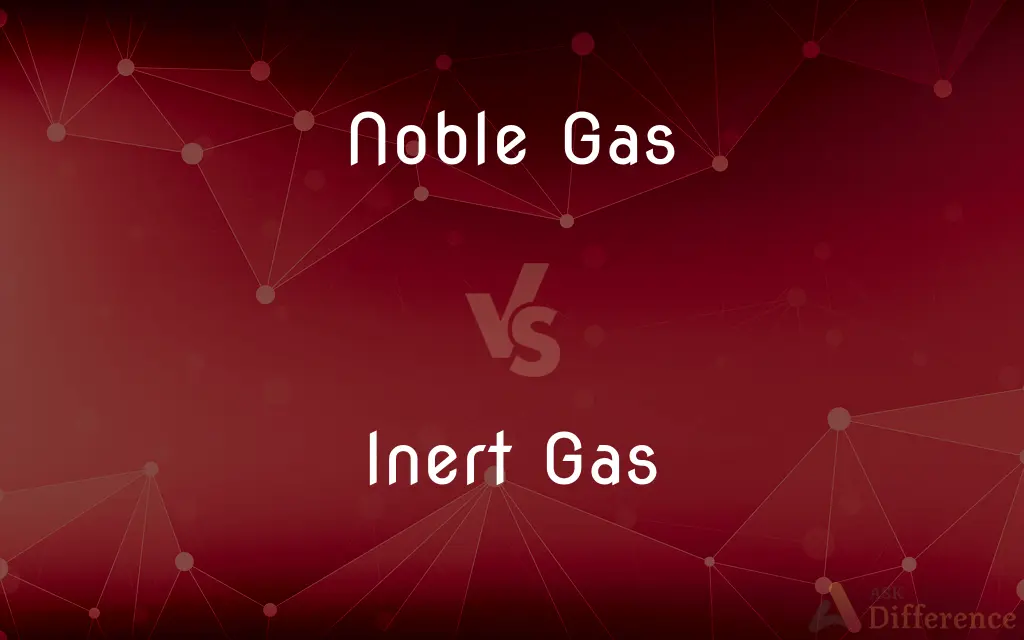Noble Gas vs. Inert Gas — What's the Difference?
By Tayyaba Rehman — Published on January 6, 2024
Noble gases are elements in group 18 of the periodic table, known for low reactivity; inert gases are any gases that resist chemical reactions under certain conditions.

Difference Between Noble Gas and Inert Gas
Table of Contents
ADVERTISEMENT
Key Differences
Noble gases, also known as inert gases, are the elements in Group 18 of the periodic table. They include helium (He), neon (Ne), argon (Ar), krypton (Kr), xenon (Xe), and radon (Rn). These gases are characterized by their full valence electron shells, which make them highly stable and unreactive under normal conditions. The term "inert gas," on the other hand, is broader and refers to any gas that does not undergo chemical reactions under a set of given conditions. While all noble gases are inert, not all inert gases are noble gases.
The main characteristic of noble gases is their lack of chemical reactivity, which is due to their complete valence electron shells. This property makes them ideal for use in non-reactive environments. In contrast, inert gases can include other gases like nitrogen (N2) and hydrogen (H2) in certain conditions where they do not react. The term "inert" in this context is more about the conditions preventing the gases from reacting, rather than their inherent properties.
Noble gases are used in various applications due to their non-reactivity, such as in lighting, welding, and as protective atmospheres in chemical processes. Inert gases, which might include noble gases and other non-reactive gases under specific conditions, are used in similar applications, but their usage depends on the conditions required for their non-reactivity.
From a chemical standpoint, noble gases are often considered the most "inert" or non-reactive, as they rarely form compounds under normal conditions. The inertness of other gases categorized as inert is conditional and can change based on environmental factors like temperature and pressure.
In summary, while all noble gases are inert, the term "inert gas" encompasses a broader range of gases that are non-reactive under certain conditions. Understanding the context and specific properties of these gases is crucial for their application in various industrial and scientific fields.
ADVERTISEMENT
Comparison Chart
Definition
Elements in Group 18 of the periodic table
Gases that do not react under certain conditions
Reactivity
Generally non-reactive
Non-reactive in specific conditions
Examples
Helium, Neon, Argon, Krypton, Xenon, Radon
Noble gases, Nitrogen (in certain conditions)
Electron Configuration
Complete valence electron shells
Varies, non-reactivity due to conditions
Typical Uses
Lighting, welding, protective atmospheres
Similar uses, depending on non-reactivity
Compare with Definitions
Noble Gas
Noble gases are inert under normal conditions.
Argon, a noble gas, is used in welding to prevent material oxidation.
Inert Gas
Inert gases are gases that resist chemical reactions.
Nitrogen is used as an inert gas in food packaging to preserve freshness.
Noble Gas
Noble gases are elements in group 18, known for their stability.
Helium, a noble gas, is used in balloons due to its non-reactive nature.
Inert Gas
Inert gases are chosen for their stability in specific environments.
Inert gases like helium are used in deep-sea diving mixtures.
Noble Gas
Noble gases are used in non-reactive applications.
Krypton, a noble gas, is used in high-performance lighting.
Inert Gas
Inert gases can include noble gases under certain conditions.
Argon, an inert gas, is used in incandescent light bulbs to prevent filament degradation.
Noble Gas
Noble gases have complete electron shells.
Neon lights use the noble gas neon for its distinct glow.
Inert Gas
Inert gases are used in applications requiring non-reactivity.
Inert gases are essential in the semiconductor manufacturing process.
Noble Gas
Noble gases rarely form chemical compounds.
Radon, despite being a noble gas, is radioactive and hazardous.
Inert Gas
Inert gases are not necessarily part of the noble gases.
Nitrogen, although an inert gas in many cases, is not a noble gas.
Common Curiosities
What does inert gas mean?
Inert gas refers to any gas that does not undergo chemical reactions under specific conditions.
What are noble gases?
Noble gases are elements in group 18 of the periodic table, characterized by their non-reactivity.
Why are noble gases non-reactive?
Their non-reactivity is due to having full valence electron shells.
Can inert gases react under any conditions?
Some inert gases can react under extreme conditions like high pressure or temperature.
What is the most abundant noble gas in the atmosphere?
Argon is the most abundant noble gas in the Earth's atmosphere.
Is helium a noble or inert gas?
Helium is both a noble and an inert gas.
What makes an inert gas different from other gases?
An inert gas does not react under certain conditions, unlike reactive gases.
Is nitrogen always considered an inert gas?
Nitrogen is considered inert in many situations, but it can react under certain conditions.
Are all noble gases inert?
Yes, all noble gases are considered inert due to their complete electron shells.
Can inert gases be other than noble gases?
Yes, gases like nitrogen can be inert in certain conditions but are not noble gases.
What is a common use of noble gases?
They are commonly used in lighting, like neon lights, and for protective atmospheres in welding.
Are noble gases used in the medical field?
Yes, noble gases like helium are used in medical applications such as MRI machines.
Why are noble gases used in light bulbs?
Their inertness helps prevent filament oxidation in bulbs.
Are inert gases safe for human exposure?
Generally, inert gases are safe, but precautions are necessary as they can displace oxygen in enclosed spaces.
Can inert gases form compounds?
Typically, inert gases do not form compounds under normal conditions.
Share Your Discovery

Previous Comparison
Link vs. Association
Next Comparison
Go-Back-N Protocol vs. Selective Repeat ProtocolAuthor Spotlight
Written by
Tayyaba RehmanTayyaba Rehman is a distinguished writer, currently serving as a primary contributor to askdifference.com. As a researcher in semantics and etymology, Tayyaba's passion for the complexity of languages and their distinctions has found a perfect home on the platform. Tayyaba delves into the intricacies of language, distinguishing between commonly confused words and phrases, thereby providing clarity for readers worldwide.













































